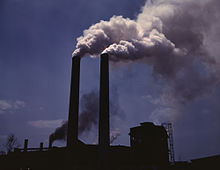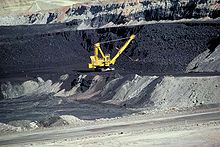Federal Climate Policy
Plain Language, Climate Change, and the Supreme Court
The language of the statute relating to next week’s argument is clear — but there’s a fly in the ointment.
The Supreme Court will be hearing argument next week in Utility Air Regulatory Group v. EPA. It’s basically a very simple statutory interpretation case, except for two things. First, it’s about climate change, and nothing about climate change ever seems to be simple and straightforward. Second, although the language of the statute, prior Supreme Court precedent, …
Continue reading “Plain Language, Climate Change, and the Supreme Court”
CONTINUE READINGIs It Unconstitutional for the President to Implement Major New Policies by Regulation?
According to the Supreme Court, when statutes are unclear, the President is supposed to make policy judgments. That’s not unconstitutional — it’s just business as usual.
The short answer is a resounding No. Some domestic initiatives obviously do require Congressional approval because they are clearly outside the authority conferred by existing law. But Congress has given the executive branch broad discretion to regulate in many areas, and the executive branch can use that authority for major policy initiatives. The only real …
CONTINUE READINGEmmett Center Files Amicus Brief in U.S. Supreme Court GHG Case on Behalf of South Coast Air District
UCLA’s Emmett Center filed an amicus curiae brief yesterday in Utility Air Regulatory Group (UARG) v. EPA, the U.S. Supreme Court case that will determine whether EPA’s greenhouse gas emissions rules under the Prevention of Significant Deterioration section of the Clean Air Act are valid. Arguing on behalf of the South Coast Air Quality …
CONTINUE READINGThe Quiet Failure of Climate Denial in 2013
2013 Wasn’t A Good Year for the Opponents of Climate Science
The latest IPCC report proves that scientists are unwavering in their view that human carbon emissions are causing dangerous climate change. In the scientific world, climate denial has no traction. It isn’t gaining traction in the judicial or congressional worlds either. First, the judiciary. A three-judge panel of the D.C. Circuit, headed by a conservative …
Continue reading “The Quiet Failure of Climate Denial in 2013”
CONTINUE READINGThe Significance of EPA’s Proposed Power Plant Standards
Although they won’t have immediate impacts, EPA’s proposed rules for new coal plants will indirectly help shape the future of the industry.
There’s an uproar over EPA’s proposed rules for CO2 emissions from new coal plants, even though no one expects anyone to build a new coal plant for at least a decade. I’ve argued (here and here) that the industry won’t have standing to challenge the rules because they won’t have any imminent impact. In fact, …
Continue reading “The Significance of EPA’s Proposed Power Plant Standards”
CONTINUE READINGThe Rhetoric of Cap and Trade
Different ways of framing the concept of cap and trade help drive the public debate.
Discussions of cap and trade tend to frame it in various ways, which often skews the debate. These different frameworks guide the thoughts of both supporters and critics, sometimes in surprising ways. There are four different ways to talk about cap and trade, and they tend to lead the debate in very different directions. The …
Continue reading “The Rhetoric of Cap and Trade”
CONTINUE READINGThe Olympics of Climate Change: Warsaw 2013
What to know, where to watch
It’s that time again! The United Nations’ COP19/CMP9 Climate Change Conference kicked off this week in Warsaw, the start of two weeks of international discussion on climate change. The conference hosts the parties to the United Nations Framework Convention on Climate Change and the Kyoto Protocol, as a yearly update and check-in on these treaties, …
Continue reading “The Olympics of Climate Change: Warsaw 2013”
CONTINUE READINGStanding for Coal?
In a previous post I questioned whether anyone would have standing to challenge EPA’s new plant regulations for coal plants, considering that coal plants are current uneconomical anyway due to low natural gas prices. I was pleased that Inside EPA wrote a story about my argument, and even more pleased that the story reported on …
Continue reading “Standing for Coal?”
CONTINUE READINGWill Anyone Have Standing to Challenge EPA’s Rules for New Coal Plants?
EPA has issued rules that will essentially require new coal plants to use carbon capture and sequestration, a technology that has not been implemented at full scale yet. No doubt that coal industry and utilities will try to challenge the rules in court. But they probably lack standing to do so for a simple reason: …
Continue reading “Will Anyone Have Standing to Challenge EPA’s Rules for New Coal Plants?”
CONTINUE READINGExecutive Order calls for climate adaptation
Presidential directive holds potential to move federal adaptation efforts forward, but implementation will be the key.
Cross-posted at The Berkeley Blog. Today, President Obama issued an Executive Order intended “to prepare the Nation for the impacts of climate change by undertaking actions to enhance climate preparedness and resilience.” In some respects, this order simply continues ongoing efforts. Under this administration, the executive branch has already been doing a great deal of …
Continue reading “Executive Order calls for climate adaptation”
CONTINUE READING











